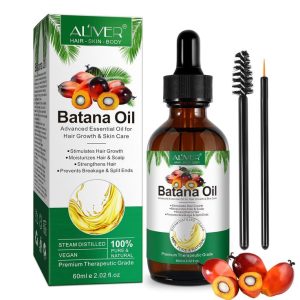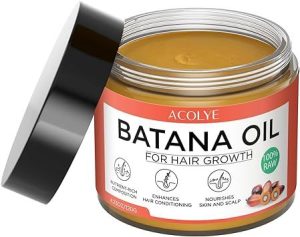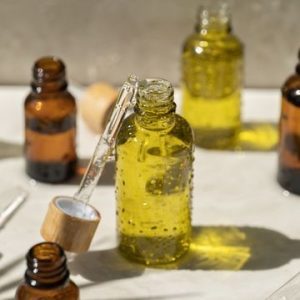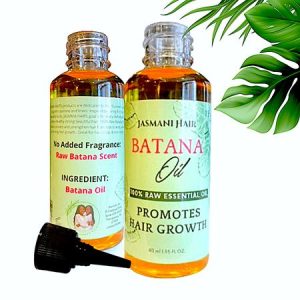
Batana oil is a natural oil derived from the Pata de Vaca nut, a plant native to Central and South America. It has been traditionally used for various purposes, including hair care. While some people consider batana oil a natural remedy for hair growth and health, there is limited scientific evidence to support these claims. However, batana oil may offer some potential benefits for hair, depending on your hair type and goals. Here’s a closer look at batana oil and how it can be used for hair care.
Understanding Batana Oil Properties
Batana oil is rich in vitamins and fatty acids, which are important for overall health and well-being. However, how these nutrients translate to benefits for hair is still being studied. Here’s what we know about the properties of oil:
Moisturizing:
Batana oil has emollient properties, which means it can help coat the hair shaft and lock in moisture. This can be beneficial for dry, brittle hair.
Shine-enhancing:
Batana oil can add a natural shine to hair.
Scalp soothing:
Some people find that batana oil can help soothe a dry, itchy scalp.
It’s important to note that everyone’s hair is different, and what works for one person might not work for another. If you have any concerns about using oil on your hair, consult with a dermatologist or licensed trichologist (a hair and scalp specialist).
Considering Batana Oil for Your Hair Care Routine
If you’re interested in trying oil for your hair, here are some things to consider:
-
Hair type: Batana oil might be more beneficial for dry or damaged hair. People with fine or oily hair might find it too heavy.
-
Potential allergic reaction: As with any new product, it’s important to do a patch test before applying batana oil to your entire scalp. Apply a small amount of oil to your inner elbow and wait 24 hours to see if there’s any irritation.
-
Quality and sourcing: Look for batana oil that is cold-pressed and unrefined for the greatest potential benefits.
How to Use Batana Oil on Hair
There are several ways to incorporate batana oil into your hair care routine. Here are a few methods:
-
Pre-shampoo treatment: Massage a small amount of batana oil onto your scalp and hair before shampooing. Leave it on for 30 minutes to an hour, then wash your hair as usual.
-
Deep conditioner: Mix a few drops of batana oil with your regular conditioner for an extra boost of moisture. Apply the mixture to your hair, focusing on the ends, and leave it on for 20 minutes before rinsing.
-
Leave-in conditioner: Apply a very small amount of batana oil to damp hair, focusing on the ends, to help tame frizz and add shine. Be mindful of using too much, as it can weigh down hair.
Natural Hair Care Alternatives
Batana oil is just one of many natural ingredients that people use for hair care. Here are some other options to consider:
-
Coconut oil: Similar to batana oil, coconut oil has moisturizing properties and can help add shine to hair.
-
Argan oil: Argan oil is known for its richness in vitamin E and fatty acids, which can help nourish and strengthen hair.
-
Aloe vera: Aloe vera gel can help soothe an itchy scalp and add moisture to hair.
-
Apple cider vinegar: Apple cider vinegar can be used as a natural hair rinse to help detangle hair and add shine.
Remember, a healthy hair care routine goes beyond just the products you use. Eating a balanced diet, drinking plenty of water, and managing stress can all contribute to healthy hair growth.
There’s no one-size-fits-all approach to hair care. Experimenting with different natural oils and ingredients can help you find what works best for your hair type and goals. Batana oil may be a natural hair care option worth exploring, but be sure to use it cautiously and prioritize overall health practices for beautiful hair.

Finding the Right Hair Care Routine for You
There are many factors to consider when creating a hair care routine. Here are some tips:
-
Hair type: Different hair types have different needs. For example, curly hair might benefit from more moisture than straight hair. Consider your hair type when choosing products and techniques.
-
Scalp health: A healthy scalp is important for healthy hair growth. If you have concerns about your scalp health, consult a dermatologist or trichologist.
-
Overall health: Diet, stress levels, and genetics can all impact hair health. Maintaining a healthy lifestyle can contribute to beautiful hair.
Remember: There is no magical one-size-fits-all hair care routine. Experiment with different techniques and products to find what works best for you.
Natural Hair Care Options
There are many natural ingredients that people use for hair care. Here are some options to explore alongside batana oil:
-
Carrier oils: Carrier oils like coconut oil, jojoba oil, and argan oil can be used as moisturizers or added to DIY hair masks.
-
Aloe vera: Aloe vera gel can be used to soothe an itchy scalp and add moisture to hair.
-
Apple cider vinegar: Apple cider vinegar rinses can help detangle hair and add shine.
-
Healthy diet: Eating a balanced diet with plenty of fruits, vegetables, and whole grains can nourish your hair from the inside out.
Finding Reliable Hair Care Information
There are many resources available online and offline that can provide you with information about hair care. Here are a few tips for finding reliable sources:
-
Look for websites or blogs that are written by licensed hairstylists or trichologists (hair and scalp specialists).
-
Check for websites that cite scientific studies to support their claims.
-
Be wary of websites that make promises that sound too good to be true.
Remember, everyone’s hair is different, and what works for one person might not work for another. The best way to find a hair care routine that works for you is to experiment and see what your hair responds to best.
Conclusion: Embracing Your Hair Journey
Hair care is a journey of exploration and self-discovery. There are many natural options to consider when creating your hair care routine. Batana oil is one such option, but it’s important to be mindful and prioritize overall health practices for beautiful hair.
Remember: Consult a medical professional if you have any concerns about your hair or scalp health.









